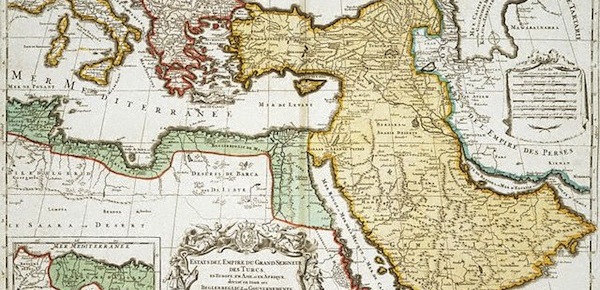Turks And Arabs
The eastern Mediterranean, the region that separates Turkey from North Africa and the Gulf, is undergoing an unprecedented transformation.

Map of Ottoman Empire, circa 1790-1800. Philip de Bay/Historical Picture Archive/Corbis.
The United States, supported by several European countries, is trying to build an alliance to confront the jihadist group, the Islamic State in Iraq and Syria. The success of that alliance, and of any chance to address the chaos unfolding in the eastern Mediterranean, rests on the cooperation of the two powers with direct stakes in the region and the ability to influence events on the ground: on one side, Turkey; on the other, the alliance emerging between Saudi Arabia, the United Arab Emirates (UAE), and Egypt.
The Arab-Turkish relationship has been fraught for centuries, and often the personal has blurred with the public. Now, Turkish positioning in the region seems opposed to the alliance between these three countries. This informal coalition is trying to preserve the regional order of the last four decades, which they see as under attack from various forces including political Islam. Turkey’s ruling party, the Islamist AKP, is sympathetic to the leading forces of that trend.
Turkey’s relationship with these three influential Arab countries is likely to remain stressed, especially with the election of Recep Tayyip Erdoğan as president of the republic and the elevation of AhmetDavutoğlu, Turkey’s former foreign minister and a key architect of its regional strategy, to prime minister.
The two sides have conflicting understandings of what the Arab uprisings of the past three years have heralded. Turkey’s leaders see the uprisings as revolutions against corrupt, autocratic regimes; reformists spearheaded the revolts, and therefore must be supported. The leaders of the influential Arab countries regard the changes that these uprisings have unleashed as perils to the social fabric, identities, and national security of their countries. They believe that by thwarting this wave of change, they have saved their countries from the chaos currently raging across the region.
In particular, the two sides also see political Islam differently. Turkey’s AKP represents a type of modern Islamism that evolved within the confines of the highly secular Kamalist Turkish state. Drawing on the experience of Turkish Islamists, the AKP was careful to strike a balance between widening and deepening its support in Turkey’s pious and conservative Anatolian hinterland as well as the lower middle class neighborhoods of the country’s sprawling cities—all while not ruffling the sensitivities of the secular middle and upper-middle classes. The AKP’s strategy was successful in using Islam as an overarching cultural and social frame of reference; religious orientation was not used as a political doctrine, restriction on economic activities, or as a social identity.
In several Arab countries, most notably Egypt, forces of political Islam have antagonized wide segments of their societies by imposing their version of Islamism on political, economic, and social life. And when they came to power—such as during former President Mohammed Morsi’s year in power—Islamists were not savvy enough to realize that enforcing an overly religious rhetoric and worldview on their societies would trigger a tsunami of anger, even from pious social groups.
These subtle but crucial differences between the Turkish and Arab experiences were lost amid the tumultuous developments that took place in the Arab world in the last two years. Turkish leaders did not appreciate the gravity of the mistake that some Arab Islamists have committed. And influential Arab regimes did not comprehend the prism from which Turkey saw the developments in their countries.
Local frustrations exacerbate this tension. Turkey’s foreign policy in the region was based on zero problems with its neighbors, economic and cultural expansion in the Arab world, and its gradual emergence as a political and economic role model for the Arab world. This policy was not only supposed to compensate for Turkey’s painfully slow progress in the European Union accession process; it was a strategic reorientation of the country’s place in the world. But in the last three years, and with the exception of the immense success that Turkish drama has achieved in the Arab world, all of these objectives have failed. And there is a sense, prevalent within the AKP’s leading circles, that Arab antipathy toward a leading Turkish role in the region contributed to this failure. On the other side, the Arabs recognize that they confront extremely difficult challenges—socio-economic in Egypt, demographic in the UAE, and political and dynastic in Saudi Arabia—that pose colossal dangers to their countries. To Arab leaders, Turkey’s support for forces that they deem perilous and that are bent on affecting a major transformation in the Arab world is a challenge from a large and powerful counterpart.
And then there are personal perceptions. Turkey’s AKP leaders see themselves as experienced politicians who have built their credibility from the bottom up through successes at local, municipal, and national elections. They regard the Gulf’s dynastic political system, and the decisive role that the military establishments play in different Arab countries, as the antithesis of their experience. Whether dictated by royal palaces or national security councils, top-down politics reminds Turkish Islamists of 1980s’ Turkey under General Kenan Evren, a period in which the Islamists were aggressively excluded from politics.
From the perspective of the Egyptian and Gulf leaders, the AKP’s Turkey has been trying, for almost a decade, to build a modern version of the Ottoman Empire, in which Istanbul has direct political, economic, and cultural influence over North Africa, parts of the eastern Mediterranean, and gradually the Gulf. This evokes old, entrenched, and for most Arabs, distasteful memories of Turkish rule in the Arab world.
Misunderstanding ultimately leads to aversion. When the stakes are high, aversion leads to conflict. There will not be a military confrontation between Turkey and the large Arab countries. But the more the interests of both sides diverge, the higher the likelihood that a regional cold war would commence. This could result in several low-intensity wars, fought through proxies. We are already witnessing confrontations, in Libya, Syria, Iraq, and to a lesser extent Lebanon, in which fighting groups seek the favor of different regional powers. A rise in the tension between, on one side, Istanbul, and on the other Cairo, Riyadh, and Abu Dhabi, could significantly fuel these confrontations, and waste a lot of resources.
Aversion takes a long time to change. But geopolitics was never about personal tastes. Emerging threats compel the Arabs and Turks to cooperate. The eastern Mediterranean, the region that separates Turkey from North Africa and the Gulf, is undergoing a transformation unprecedented since the end of World War One and the Sykes-Picot agreement that created its countries. This transformation has given rise to a state of fluidity in which disruptive forces (such as the Islamic State), sectarian powers (such as hardliner Sunni and Shiite groups), and political adventurers (of which there are many in the eastern Mediterranean) are trying to carve for themselves areas of influence. These forces are wilfully dismembering the eastern Mediterranean.
Not only will countries slowly but certainly divide along sectarian and ethnic lines; there will increasingly be major demographic shifts. For example, the communities that reside in the plains extending from eastern Syria to western Iraq are gradually moving to refugee camps in Jordan, Lebanon, and Turkey, and to shantytowns surrounding Amman, Beirut, Cairo, Istanbul, and Tripoli. Major infrastructure projects—especially water, energy, and transportation projects—will be acutely disrupted. The eastern Mediterranean, as a market, will be decimated. And the rise in jihadism and sectarianism will resonate with local fissures in Turkey, North Africa, and the Gulf.
And then there is international intervention. These perils and shifts are already drawing in the U.S., and to a lesser extent Europe, to try to douse these dangers and mould the region’s future. And as we have seen from previous foreign interventions, when the going inevitably gets tough, the international powers will withdraw, leaving the countries of the region to confront the consequences.
Experience in the last three years, especially in Iraq, Libya, and Syria, have made it amply clear that flaring situations could not be controlled. Known and unknown unknowns materialize, steer events in different directions, and disrupt carefully devised plans. Fighting groups divide, turn against old allies, and rarely obey the directions of their foreign masters. As such, Turkey and the influential Arab countries should avoid the temptation of fighting proxy-wars through pawns on the ground. They should work together now, rather than wait to live with the ghosts of the ruins that will be left from the coming destruction.
Tarek Osman is the author of the international bestseller Egypt on the Brink.
Subscribe to Our Newsletter




